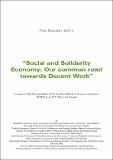Social and solidarity economy: Our common road towards decent work
| dc.contributor.author | Fonteneau, Bénédicte | |
| dc.contributor.author | Neamtan, Nancy | |
| dc.contributor.author | Wanyama, Fredrick | |
| dc.contributor.author | Morais, Leandro | |
| dc.contributor.author | Poorter, Mathieu de | |
| dc.contributor.author | Borzaga, Carlo | |
| dc.contributor.author | Galera, Giulia | |
| dc.contributor.author | Fox, Tom | |
| dc.contributor.author | Ojong, Nathaneal | |
| dc.date.accessioned | 2018-01-29T12:29:31Z | |
| dc.date.available | 2018-01-29T12:29:31Z | |
| dc.date.issued | 2011-10 | |
| dc.identifier.uri | https://repository.maseno.ac.ke/handle/123456789/326 | |
| dc.description.abstract | This chapter aims to explain the meaning and nature of the social and solidarity economy (SSE). The SSE is all around us and refers to familiar realities for everyone in the world: we are all members of at least one association, the vegetables we buy and eat are often produced or traded by people organized in cooperatives, many of us have bank accounts in cooperative or mutual banks. In various African, European and Latin American countries, health insurance is provided by mutual health organizations. We all have heard about famous social entrepreneurs like Mohamad Yunus who received the Nobel Peace Prize in | en_US |
| dc.title | Social and solidarity economy: Our common road towards decent work | en_US |
| dc.type | Article | en_US |

